
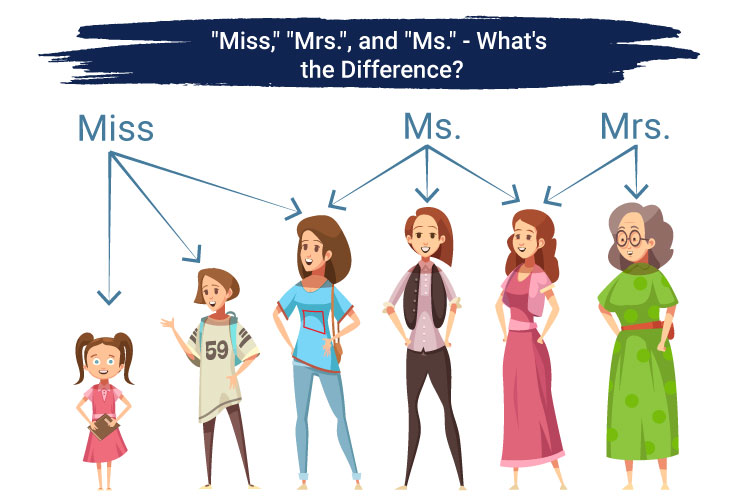
Do you ever get confused with all the different titles while addressing a lady? No worries, we all do. Especially with all the different titles Miss, Ms., and Mrs., it is quite predictable that one would end up using the wrong title, which can be quite embarrassing.
However, don’t fret. We have got your back. This article will clarify the usage of all the titles mentioned above. And hopefully, you’ll never have to be embarrassed again by addressing a lady with the wrong title.
However, you can always ask the other person how they would like to be addressed and stick to that as it’s always important to address the other person in their preferred manner.
Miss is an abbreviation of the word mistress. It is a title used as a sign of respect to address a female child or an unmarried woman. Miss is used independently or combined with a name, descriptor, a significant characteristic, or anything else representing the person.
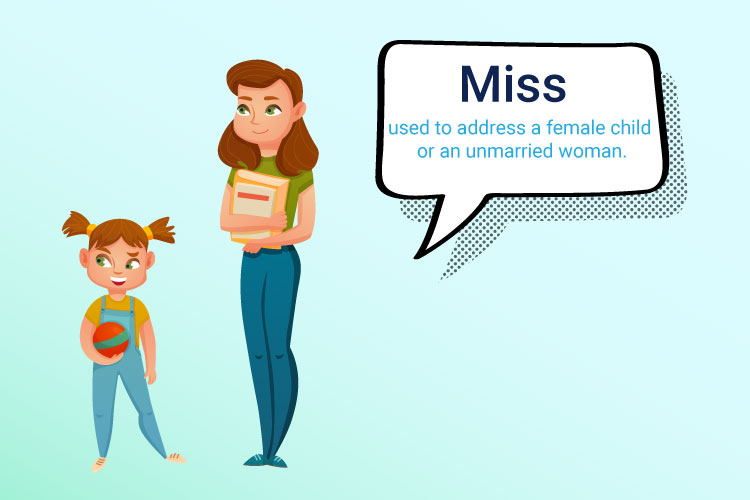
For Example:
Excuse me, Miss. You dropped your wallet.
Miss Jasmine Smith won the gold medal in the competition.
I am the next-door neighbor of Miss Amanda.
Isn’t she acting all Miss goody-two-shoes today?
“Miss” is confusing because it has a broader sense of usage.
For instance, in a “formal setting” in the “olden times,” people would use Miss with the last name of an unmarried woman, no matter how well they knew the person.
when-to-use-mrs
For Example, Miss Edwards, would you like some tea?
But it is also used when the marital status is unknown.
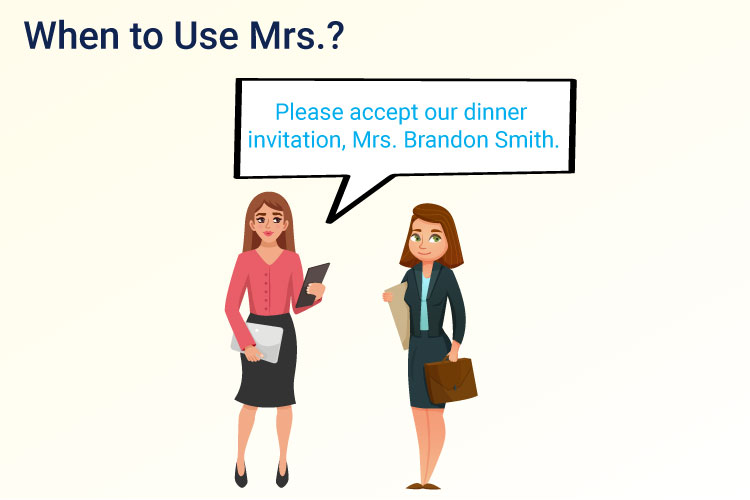
For Example:
Miss Cynthia, are you married or engaged?
Moreover, in contemporary times, “Miss” is usually used to address a young woman.
Miss Emily, you have been accepted by Saint Claire Private High School, Congratulations!!
However, it can also be used as an overture to chastisement at times.
For Example:
Miss Hannah Emily Smith!! Why did you write on the wall?
“Mrs.” is the title of respect and is used for addressing a married woman, or even widowed. Like Miss, “Mrs.” is also used before names and characteristics. The use of the title “Mrs.” is becoming less common, as most women now prefer to be addressed by their names.
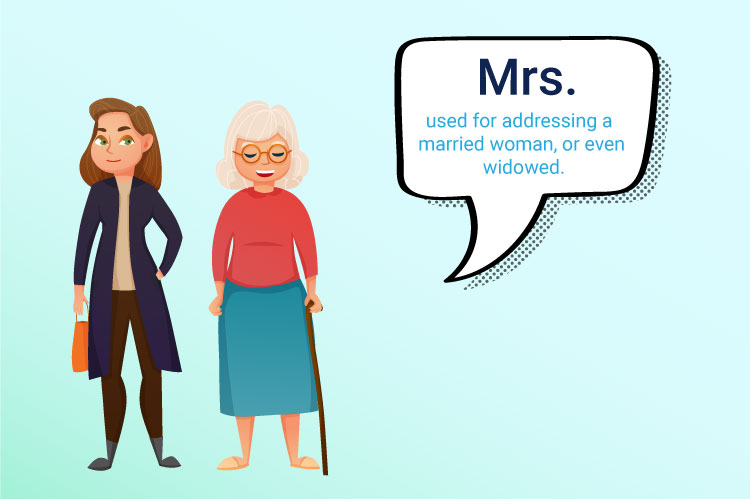
For Example:
Mr. and Mrs. Smith invited us to dinner tonight.
Mrs. Lou was the best English teacher I ever took a course from.
Mrs. Jefferson, welcome!! Would Mr. Jefferson be joining you for lunch?
Mrs. is used in a formal setting to address a married woman and is usually placed before the husband’s first and last name.
For Example:
Please accept our dinner invitation, Mrs. Brandon Smith.
It is also used to address a woman in a position of authority.
For Example:
Mrs. Stewart said there would be a quiz tomorrow morning.
The difference among the 3 are as follows:
Miss – used to address young, unmarried women
Ex. Miss Jane is fond of buying cosmetics.
Mrs – used to address married women
Ex. Mrs. Jones, the wife of Arthur, sent us an apple pie.
Ms – used if you are unsure whether the woman you are referring to is single or married or the woman concerned prefers to be addressed with a marital-status neutral title.
Ex. Ms. Smith prefers cats over dogs.
Lazhar Ichir Director at Breeding Business
You can use Ms. to address any female, married or unmarried. So when you don’t have the context, Ms. is your best choice. It is a good alternative for “Miss” and “Mrs.”.
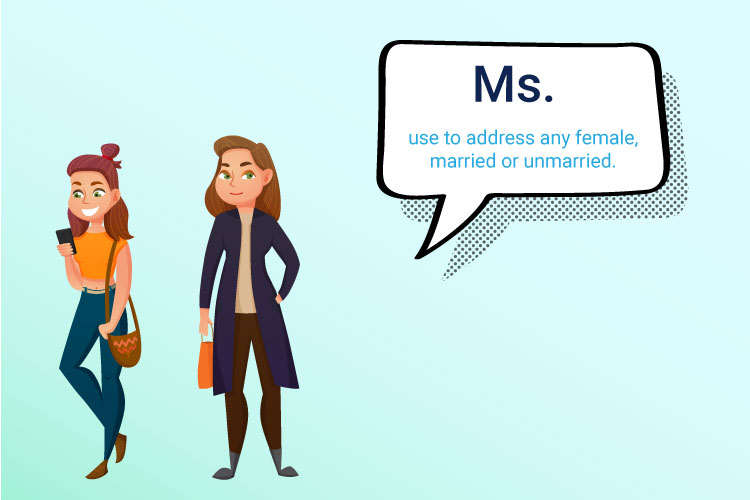
Its use was first coined in the 1950s, but with the uprising of the women’s movement in the 1970s, its use became more common. Just like “mister,” that was the title of respect for both married and unmarried men, “Ms.” became the title of respect for both married and unmarried women.
When you don’t have the contextual information on someone’s marital status, you can’t go wrong with using Ms.

For Example:
Ms. Penelope is waiting for you in the lounge.
Ms. Sabrina. Please Come in. It’s nice to have you join us for lunch.
Apply the same rules for “Ms.” as you would for “Miss” and “Mrs.”. Place it before a person’s name, like “Miss Anna,” or you can use it independently as you would use “Mr.” as a form of address, like “Have a seat “Ms.”.
It can be confusing when to use “Miss” and when to use “Ms.”. But choose the title based on the preference of the other person. “Miss” is used to address an unmarried woman specifically, whereas “Ms.” is agnostic to marital status, making it a more neutral and safe option.
These days, the common practice is to address people with their full name, excluding the titles. Newspapers adopt this practice too. However, they retain the titles when used in the quotes.
The titles are the same for British and American English; however, the difference is that British titles don’t have a period followed by the title. In contrast, the American version of these titles does have a period in the end.
British English = Ms, Mrs, Miss
American English = Ms., Mrs., Miss.
The second difference is in the pronunciation. British people often pronounce “Mrs.” as “Missus.” In comparison, Americans pronounce it as “Miss-is” or “Miss-iz” in the northern regions and as “Miz-iz” or “Miz” in the southern regions. The southern Americans, at times, pronounce Ms. as “Miz,” so their Mrs. and Ms. often sound the same. Whereas Miss. and Ms. are both pronounced similar to “this” almost everywhere globally.
Proper pronunciation, grammar, and titles are very important in the English language, especially when addressing wedding invitations or in person. This article will let you use all these titles appropriately, and you’ll never be embarrassed again. However, the golden rule for using titles will always be to ask which title the other person prefers and always address them by that title.